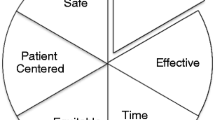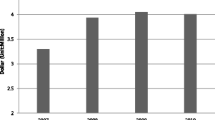Abstract
Previous studies show that the healthcare industry lags behind many other economic sectors in the adoption of information technology. The purpose of this study is to understand differences in structural characteristics between providers that do and that do not adopt Health Information Technology (HIT) applications. Publicly available secondary data were used from three sources: American Hospital Association (AHA) annual survey, Healthcare Information and Management Systems Society (HIMSS) analytics annual survey, and Healthcare Cost and Utilization Project (HCUP) Nationwide Inpatient Sample (NIS) databases. Fifty-two information technologies were grouped into three clusters: clinical, administrative, and strategic decision making ITs. Negative binomial regression was applied with adoption of technology as the dependent variables and eight organizational and contextual factors as the independent variables. Hospitals adopt a relatively larger proportion of administrative information technology as compared to clinical and strategic IT. Large size, urban location and HMO penetration were found to be the most influential hospital characteristics that positively affect information technology adoption. There are still considerable variations in the adoption of information technology across hospitals and in the type of technology adopted. Organizational factors appear to be more influential than market factors when it comes to information technology adoption. The future research may examine whether the Electronic Health Record (EHR) Incentive Program in 2011 would increase the information technology uses in hospitals as it provides financial incentives for HER adoptions and uses among providers.

Similar content being viewed by others
References
Centers for Medicare and Medicaid Services, National health expenditure projections 2009–2019. http://www.cms.gov/NationalHealthExpendData/downloads/proj2009.pdf. Accessed 11 06 2012, 2009.
Blendon, R. J., Schoen, C., DesRoches, C., Osborn, R., and Zapert, K., Common concerns amid diverse systems: Health care experiences in five countries. Heal. Aff. 22:106–121, 2003.
Chaudry, B., Wang, J., Wu, S., Maglione, M., Mojica, W., Roth, E., and Shekelle, P. G., Systematic review: Impact of health information technology on quality, efficiency, and costs of medical care. Ann. Intern. Med. 144:742–752, 2006.
Hillestad, R., Bigelow, J., Bower, A., Girosi, F., Meili, R., Scoville, R., and Taylor, R., Can electronic medical record systems transform health care? potential health benefits, savings, and costs. Heal. Aff. 24:1103–1117, 2005.
Institute of Medicine, To Err is Human: Building a Safer Health System. National Academy Press, Washington, DC, 2000.
Classen, D. C., Pestotnik, S. L., Evans, R. S., Lloyd, J. F., and Burke, J. P., Adverse drug events in hospitalized patients: Excess length of stay, extra costs, and attributable mortality. JAMA 277:301–306, 1997.
Altman, D. E., Clancy, C., and Blendon, R. J., Improving patient safety—5 years after the IOM report. N. Engl. J. Med. 35:2041–2043, 2004.
Graig, L. A., Health of Nations: An International Perspective on U.S. Health Care Reform, 3rd edition. CQ Press, Washington, DC, 1999.
Taylor, R., Bower, A., Girosi, F., Bigelow, J., Fonkych, K., and Hillestad, R., Promoting health information technology: Is there a case for more-aggressive government action? Heal. Aff. 24:1234–1245, 2005.
Kazley, S., and Ozcan, Y. A., Do hospitals with electronic medical records (EMRs) provide higher quality care? Med. Care Res. Rev. 65:496–513, 2008.
Galanter, W. L., Hier, D. B., Jao, C., and Sarne, D., Computerized physician order entry of medications and clinical decision support can improve problem list documentation compliance. Int. J. Med. Inform. 79:332–338, 2010.
Bates, D. W., Leape, L. L., Cullen, D. J., Laird, N., Petersen, L. A., Teich, J. M., and Seger, D. L., Effect of computerized physician order entry and a team intervention on prevention of serious medication errors. JAMA 280:1311–1316, 1998.
Davis, R. L., Wright, J., Chalmers, F., Levenson, L., Brown, J. C., Lozano, P., et al., A cluster randomized clinical trial to improve prescribing patterns in ambulatory pediatrics. PLoS Clin. Trials 2:11, 2007.
Pizziferri, L., Kittler, A. F., Volk, L. A., Honour, M. M., Gupta, S., Wang, S., and Bates, D. W., Primary care physician time utilization before and after implementation of an electronic health record: A time-motion study. J. Biomed. Inform. 38:176–188, 2005.
Wang, S. J., Middleton, B., Prosser, L. A., Bardon, C. G., Spurr, C. D., Carchidi, P. J., and Bates, D. W., A cost-benefit analysis of electronic medical records in primary care. Am. J. Med. 114:397–403, 2003.
Samore, M., Lichtenberg, D., Saubermann, L., Kawachi, C., and Carmeli, Y., A clinical data repository enhances hospital infection control. Proceedings of American Medical Informatics Association Annual Fall Symposium, Nashville, TN, USA, AMIA: 56–60, 1997.
Cannon, D. S., and Allen, S. N., A comparison of the effects of computer and manual reminders on compliance with a mental health clinical practice guideline. J. Am. Med. Inform. Assoc. 7:196–203, 2000.
Mullett, C. J., Evans, R. S., Christenson, J. C., and Dean, J. M., Development and impact of a computerized pediatric antiinfective decision support program. Pediatrics 108(e75), 2001.
Schnipper, J. L., Linder, J. A., Palchuk, M. B., Einbinder, J. S., Postilnik, A., and Middleton, B., “Smart Forms” in an electronic medical record: Documentation-based clinical decision support to improve disease management. J. Am. Med. Inform. Assoc. 15:513–523, 2008.
Yu, F. B., Menachemi, N., Berner, E. S., Allison, J., Weissman, N. W., and Ouston, T., Full implementation of computerized physician order entry and medication-related quality outcomes: A study of 3364 hospitals. Am. J. Med. Qual. 24:278–286, 2009.
Neumann, P. J., Parente, S. T., and Paramore, L. C., Potential savings from using information technology applications in health care in the United States. Int. J. Technol. Assess. 3:425–435, 1996.
Poon, E. G., Jha, A. K., Christino, M., Honour, M. M., Fernandopulle, R., Middleton, B., and Kaushal, R., Assessing the level of healthcare information technology adoption in the United States: A snapshot. BMC Med. Inform. Decis. Mak. 6:1–9, 2006.
Austin, C., and Boxerman, S., Information systems for health services administration, 5th edition. Health Administration Press, Chicago, IL, 1998.
Burke, D. E., and Menachemi, N., Opening the black box: Measuring hospital information technology capability. Health Care Manag. Rev. 29:207–217, 2004.
Wang, B. B., Wan, T. T. H., Burke, D. E., Bazzoli, G. J., and Lin, B. Y. J., Factors influencing health information system adoption in American hospitals. Health Care Manag. Rev. 30:44–51, 2005.
Burke, D. E., Wang, B. B., Wan, T. T. H., and Diana, M. L., Exploring hospitals’ adoption of information technology. J. Med. Syst. 26:349–355, 2002.
Kazley, S., and Ozcan, Y. A., Organizational and environmental determinants of hospital EMR adoption: A national study. J. Med. Syst. 31:375–384, 2007.
Furukawa, M. F., Ragu, T. S., Trent, J. S., and Vinze, A., Adoption of health information technology for medication safety in U.S. hospitals, 2006. Heal. Aff. 27:865–875, 2008.
Parente, S. T., and Van Horn, R. L., Valuing hospital investment in information technology: Does governance make a difference? Health Care Finance R. 28(2):31–43, 2006.
Amarasingham, R., Diener-West, M., Plantinga, L., Cunningham, A. C., Gaskin, D. J., and Powe, N. R., Hospital characteristics associated with highly automated and usable clinical information systems in Texas, United States. BMC Med. Inform. Decis. Mak. 8(1):1–17, 2008.
Miller, M. R., Pronovost, P., Donithan, M., Zeger, S., Zhan, C., Morlock, L., and Meyer, G. S., Relationship between performance measures and accreditation: Implications for quality of care and patient safety. Am. J. Med. Qual. 20:239–252, 2005.
Conflicts of interest
The authors declare that they have no conflict of interest.
Author information
Authors and Affiliations
Corresponding author
Rights and permissions
About this article
Cite this article
Zhang, N.J., Seblega, B., Wan, T. et al. Health Information Technology Adoption in U.S. Acute Care Hospitals. J Med Syst 37, 9907 (2013). https://doi.org/10.1007/s10916-012-9907-2
Received:
Accepted:
Published:
DOI: https://doi.org/10.1007/s10916-012-9907-2




